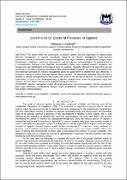| dc.contributor.author | Nabukeera, M. Sebyala | |
| dc.date.accessioned | 2020-11-22T07:58:41Z | |
| dc.date.available | 2020-11-22T07:58:41Z | |
| dc.date.issued | 2018-11-03 | |
| dc.identifier.citation | Madinah, N.(2018).Governance Of Electoral Processes In Uganda.Journal of Research in Humanities and Social Science Volume 6,Issue 1.) pp.: 39-53 . | en_US |
| dc.identifier.issn | 2321-9467 | |
| dc.identifier.uri | http://ir.iuiu.ac.ug/xmlui/handle/20.500.12309/742 | |
| dc.description | This article offers the continuation of election systems but sets beginnings of understanding electoral management in Uganda specifically designing an election management model, electoral governance, electoral commission, election management body, legal framework, constitutional changes, major developments, challenges, continuous improvements, and post-election, democratization. | en_US |
| dc.description.abstract | This article offers the continuation of election systems but sets beginnings of understanding electoral management in Uganda specifically designing an election management model, electoral governance, electoral commission, election management body, legal framework, constitutional changes, major developments, challenges, continuous improvements, and post-election, democratization. The historical lack of a comprehensive framework for Electoral administration bodies have indebted election spectators and managers to make declarations on the basis of imperfect evidence, regularly collected on the day of the vote and count and on the basis of political convenience rather than the facts on ground. The intent in this article is the new framework provided for electoral management bodies to support them to perform their duty effectively. A qualitative method of analysis was used through library research. The framework delineated here will make it possible to identify arrangements for the success and failure in the fairness of elections. It should enable all stakeholders to focus on the challenging areas of election administration, where the government might then choose to focus its efforts to improve the quality of subsequent elections. | en_US |
| dc.language.iso | en | en_US |
| dc.publisher | Quest Journals | en_US |
| dc.relation.ispartofseries | Journal of Research in Humanities and Social Science;Volume 6, Issue 1 | |
| dc.subject | Election management model | en_US |
| dc.subject | Electoral governance | en_US |
| dc.subject | Electoral commission | en_US |
| dc.subject | Election management body | en_US |
| dc.subject | Legal framework | en_US |
| dc.subject | Constitutional changes | en_US |
| dc.subject | Major developments | en_US |
| dc.subject | Challenges | en_US |
| dc.subject | Continuous improvements | en_US |
| dc.subject | Post-election | en_US |
| dc.subject | Democratization | en_US |
| dc.title | Governance Of Electoral Processes In Uganda | en_US |
| dc.type | Article | en_US |

